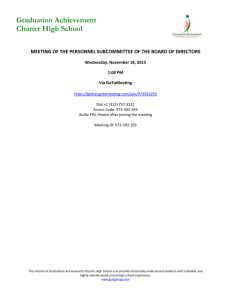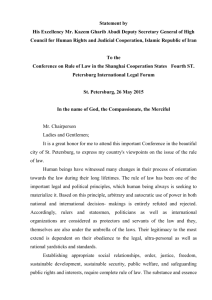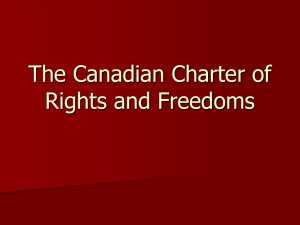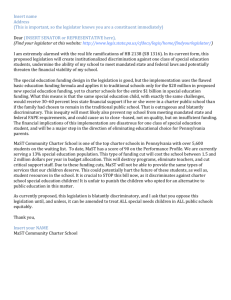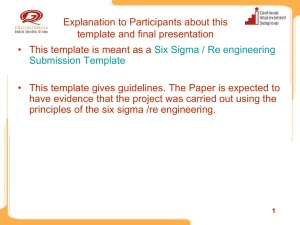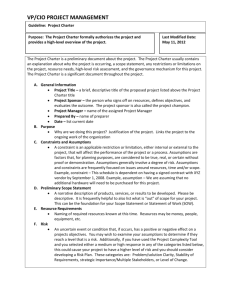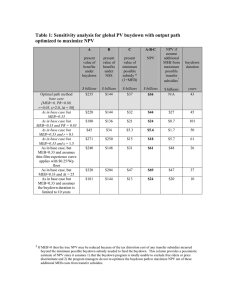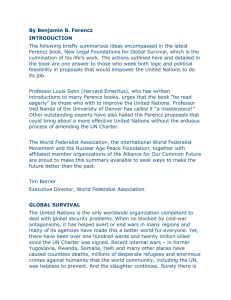DAY 2 MUN SEPT 4 CLASS (Notes Ms. Bongiovanni took) Dr
advertisement
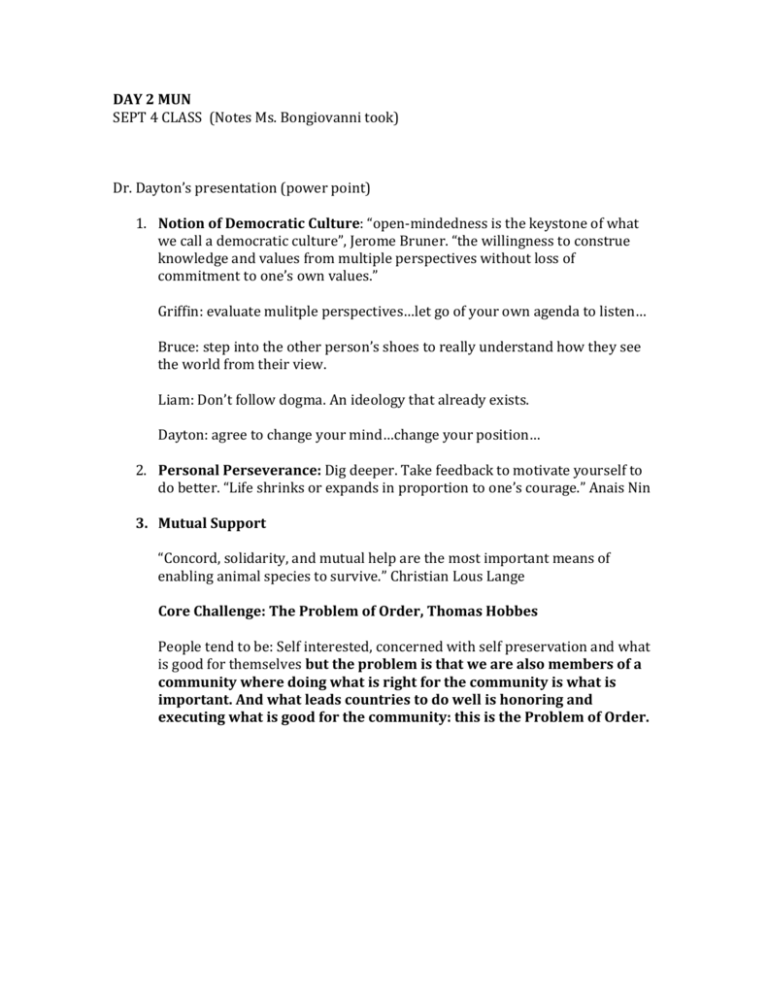
DAY 2 MUN SEPT 4 CLASS (Notes Ms. Bongiovanni took) Dr. Dayton’s presentation (power point) 1. Notion of Democratic Culture: “open-mindedness is the keystone of what we call a democratic culture”, Jerome Bruner. “the willingness to construe knowledge and values from multiple perspectives without loss of commitment to one’s own values.” Griffin: evaluate mulitple perspectives…let go of your own agenda to listen… Bruce: step into the other person’s shoes to really understand how they see the world from their view. Liam: Don’t follow dogma. An ideology that already exists. Dayton: agree to change your mind…change your position… 2. Personal Perseverance: Dig deeper. Take feedback to motivate yourself to do better. “Life shrinks or expands in proportion to one’s courage.” Anais Nin 3. Mutual Support “Concord, solidarity, and mutual help are the most important means of enabling animal species to survive.” Christian Lous Lange Core Challenge: The Problem of Order, Thomas Hobbes People tend to be: Self interested, concerned with self preservation and what is good for themselves but the problem is that we are also members of a community where doing what is right for the community is what is important. And what leads countries to do well is honoring and executing what is good for the community: this is the Problem of Order. ESSENTIAL QUESTION FOR THE CLASS Dr. Dayton’s Q: What are the ways or means to overcome the problem of Order and help people to do the right thing? Sarah’s A: give people incentives and opportunities Ex of Pakistan and education initiative. A 1 INCENTIVES: doing the right thing for the wrong reason. Spencer: Interantional Ex: UN placing sanctions of countries for human rights abuses. A sanction is a trade restriction that hurts someone’s economy. A2 THREATEN/COERCION/ PUNISHMENT. Functions of government (law & order)=coercion A3 VALUES TRANSFORMATION change beliefs as sustainable solution Advantages & disadvantages/costs for the community of each: A3 takes time. Ex of disadvantage. A1 happens quickly. !! Problem of order exists at every level of social organization (families, institutions) but is the worst /most pronounced in International Relations WHY? 1. The principle of State sovereignty: Article 2.7 of UN Charter: Un cannot interfere with anything specific to domestic order of state. 2. Diversity 3. Nationalism. MEB Q: How would students feel about standing to answer Qs, facing the audience, answering in complete sentences, attempting to cite an example, agreeing to use a presentation/audible voice? The Problem of Identity: Ex Nationalism defines US moral stance on children not working in factories. Yet we buy things form Pottery Barn where products are made from children in factories. What is it that allows us to say what is wrong for others and not for ourselves? Does UN have power to compel a country to send troops? In UN everything depends on the states agreeing to do things for the UN. Its ability to set rules and enforce them is completely dependent on states. MEB Q: How well do we all know the UN Charter? Options for Overcoming the Problem of Order in International Politics? 1. World Government (make the international community like a state) 2. Values Transformation (this is a lot of what UN does: the international Convention of Human Rights for example) Fact: Not all nations are signatories to the International Doctrine of Human Rights. 3. Functional Ties=Enlightened Self-Interest 4. The most powerful states impose order through force Creating a global community that defies the problem of order: overlying/essential objective of UN WHEN WHY UN FOUNDED: overview 1945 founded. Its predecessor= League of Nations. Why founded? The world was traumatized having gone through two WWs, 2 horrible events. Formed out of the ashes of WW2. A place for debate. F(x)s of UN: 1. Forum of debate: public space where reps of every country could debate issues impo to them. 2. Safety Valve 3. Climb down venue 4. Collective legitimization: collectively together we can develop principles of conduct & write resolutions & say these things as representative documents of what world community stands for MEB Q: How well do students know geographic locales of most countries? www.un.org for Preamable SECURITY COUNCIL: How is it unique as an agency? Only agency that authorize the use of military force, recognize sovereign authority of territory, sanctions, condemnations Verbal condemnations/Proclamtions then sanctions then authorization of force: this is the scale CHINA UK US FR RUSSIA: 5 nations in the security council. Why? The victors of WW2! The Allies Whole size? 15. Veto Power: The Big 5 has veto power. This is a problematic dynamic and function of security council. Takes an absolute majority for Security Council to be able to do anything. Prime mission (in UN Charter): address threats to international peace & security. The article behind which the security council often hides: Article 2.7 GENERAL ASSEMBLY: 193 members 1 Vote per state No veto power Forum for multi-lateral discussion of full spectrum of international issues covered in the charter. Resolutions in 4 Broad Area: disarm, economy, social & humanitarian, cult & political I left a few minutes before lecture ended to teach my next class. See Power Point on website.




